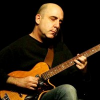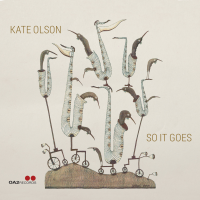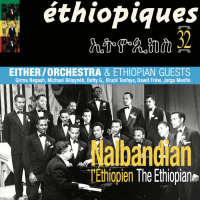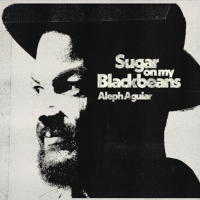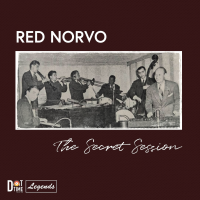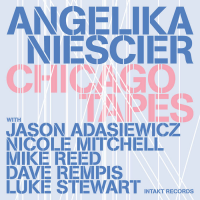Home » Jazz Articles » Album Review » Don Thompson / Rob Piltch: Bells... Now and Then
Don Thompson / Rob Piltch: Bells... Now and Then
Rob Piltch came from a musical family. His father Bernie (sax) and his brother David (bass) were well-known jazz musicians in Canada, both playing with many big-name artists. Piltch began playing professionally in 1973 at the age of 17. Six years later, he joined Blood, Sweat & Tears, touring North America and recording with them for the next two years. Bells was his debut recording. When asked about his career choices, he recalls, "I was presented with an opportunity to tour in the US as a jazz sideman, but I was getting more interested in playing different styles of guitar and music. The world of TV, film and session work was healthy, and I loved living in Canada where I was born. That was my fork in the road and that's the path I chose."
Thompson first met the teenage finger-style guitarist Piltch in 1975. Seven years later, Thompson produced the original sessions at his home studio, which became the acclaimed album Bells (Umbrella, 1982). Bells...Now and Then is not only a remaster and reissue of this mostly forgotten release but serves as a reunion as well. The original nine tracks are bookended by two new recordings done by the pair in September 2023. Since Thompson hadn't played his upright bass in four years, he is heard solely on piano on these two new tracks. He had played piano on five cuts on the original album, while two tracks saw him on bass and two on vibes.
The album starts with a new recording of, "Circles," a Thompson composition performed as the title track of a Hall 1981 trio album on the Concord label. It begins with Piltch playing the lovely melody before Thompson enters with a pretty counterpoint. The two sounds mesh wonderfully and set up what to expect on the rest of the album.
"Caribbe" follows and is an up-tempo, joyful celebration in the manner of Sonny Rollins' "Don't Stop The Carnival" and features Piltch jamming on the theme accompanied by the robust sound of Thompson's bass. "September" is a stunning ballad with guitar/piano, once again showing the empathy and abilities of the players. Thompson states, "We just play the way we play. And there's a certain amount of telepathy between us when we play together. There's only about four or five people in my whole life I've ever connected with like that."
"Stratford Stomp" begins with an Ornette Coleman-type melody line leading to a post-bop jam with Peterson showing his harmonic skills on the piano, followed by a freewheeling exchange. Thompson comps forcefully behind Piltch's fluid, bop-inspired solo. The guitar returns the favor, playing walking bass lines behind Thompson's swinging piano. "Bells," the title track of the original album, is a solo piano outing from Thompson. It is a haunting, lyrical melody with overtones of "You Must Believe In Spring."
Side two of the original album is a suite, comprised of five songs. "Kyoto" opens with Piltch plumbing the deep register on acoustic guitar before Thompson shows his virtuosity by playing a superb lead bass. "Moon Dance" has Piltch playing subtle and ringing harmonics much like Lenny Breau until the piano joins in. "Red Dragonfly" features Piltch working a volume pedal to create an ethereal sound, while the piano enters to continue that feeling on this soothing ballad. The last two parts of the suite feature Thompson on vibes. "Nexus" has Piltch using the volume pedal again playing warm tones before the piece descends into a dissonant section. Joined by the vibes, it becomes a "free" piece, experimenting with the sounds these instruments can combine to make, before becoming peaceful at the end. The suite closes with "Chant" which Piltch had originally envisioned as a Gregorian Chant with a string orchestra. The volume pedal is used to create the sound of the chant being sung, while the vibes play single sustained notes, helping create the track's spiritual sound.
The album closer "Days Gone By," is another Thompson composition originally recorded in 1982. It begins with the pianist's large, lush sound. Piltch enters quietly, slowing things down with his warm tone. It continues with each player exploring the melody and harmonics, either solo or together with their shared understanding of the space in between. It is a superb way to cap off a wonderfully conceived and played album. It is both enchanting and adventurous. The two new tracks fit seamlessly into the original album which makes one realize how timeless and special this recording was and still is.
Track Listing
Circles; Caribe; September; Stratford Stomp; Bells; Suite: I. Kyoto; II. MoodDance; III. Red Dragonfly; IV. Nexus; V. Chant; Days Gone By.
Personnel
Don Thompson
bassRob Piltch
guitarAdditional Instrumentation
Don Thompson: piano (1, 3, 4, 5, 7, 8, 11), bass (2, 6), vibes (9, 10); Rob Piltch: guitar (1-4, 6-11).
Album information
Title: Bells... Now and Then | Year Released: 2023 | Record Label: Modica Music
Tags
PREVIOUS / NEXT
Support All About Jazz
 All About Jazz has been a pillar of jazz since 1995, championing it as an art form and, more importantly, supporting the musicians who make it. Our enduring commitment has made "AAJ" one of the most culturally important websites of its kind, read by hundreds of thousands of fans, musicians and industry figures every month.
All About Jazz has been a pillar of jazz since 1995, championing it as an art form and, more importantly, supporting the musicians who make it. Our enduring commitment has made "AAJ" one of the most culturally important websites of its kind, read by hundreds of thousands of fans, musicians and industry figures every month.




